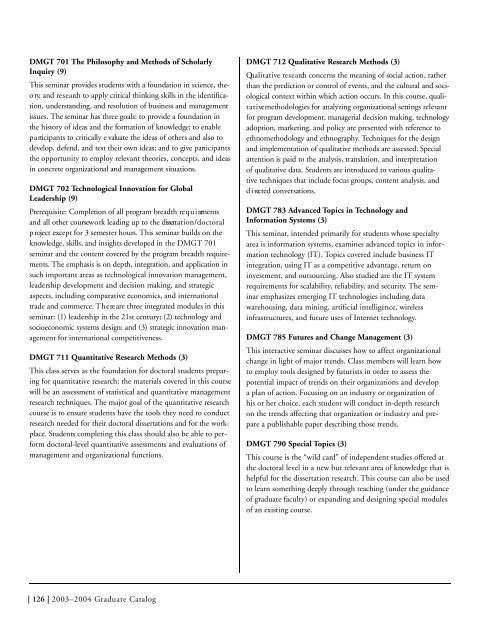A+B. Intro_SJ.1 - University of Maryland University College
A+B. Intro_SJ.1 - University of Maryland University College
A+B. Intro_SJ.1 - University of Maryland University College
Create successful ePaper yourself
Turn your PDF publications into a flip-book with our unique Google optimized e-Paper software.
DMGT 701 The Philosophy and Methods <strong>of</strong> Scholarly<br />
Inquiry (9)<br />
This seminar provides students with a foundation in science, theo<br />
ry, and re s e a rch to apply critical thinking skills in the identification,<br />
understanding, and resolution <strong>of</strong> business and management<br />
issues. The seminar has three goals: to provide a foundation in<br />
the history <strong>of</strong> ideas and the formation <strong>of</strong> knowledge; to enable<br />
p a rticipants to critically e valuate the ideas <strong>of</strong> others and also to<br />
d e ve l o p, defend, and test their own ideas; and to give part i c i p a n t s<br />
the opportunity to employ relevant theories, concepts, and i d e a s<br />
in concrete organizational and management situations.<br />
DMGT 702 Technological Innovation for Global<br />
Leadership (9)<br />
Pre requisite: Completion <strong>of</strong> all program breadth re q u i rements<br />
and all other coursew o rk leading up to the dissert a t i o n / d o c t o r a l<br />
p roject except for 3 semester hours. This seminar builds on the<br />
k n owledge, skills, and insights developed in the DMGT 701<br />
seminar and the content cove red by the program breadth re q u i rements.<br />
The emphasis is on depth, integration, and application in<br />
such important areas as technological innovation management,<br />
leadership development and decision making, and strategic<br />
aspects, including comparative economics, and international<br />
trade and commerce. T h e re are three integrated modules in this<br />
seminar: (1) leadership in the 21st century; (2) technology and<br />
socioeconomic systems design; and (3) strategic innovation management<br />
for international competitiveness.<br />
DMGT 711 Quantitative Research Methods (3)<br />
This class serves as the foundation for doctoral students preparing<br />
for quantitative research; the materials covered in this course<br />
will be an assessment <strong>of</strong> statistical and quantitative management<br />
research techniques. The major goal <strong>of</strong> the quantitative research<br />
course is to ensure students have the tools they need to conduct<br />
research needed for their doctoral dissertations and for the workplace.<br />
Students completing this class should also be able to perform<br />
doctoral-level quantitative assessments and evaluations <strong>of</strong><br />
management and organizational functions.<br />
DMGT 712 Qualitative Research Methods (3)<br />
Qu a l i t a t i ve re s e a rch concerns the meaning <strong>of</strong> social action, rather<br />
than the prediction or control <strong>of</strong> events, and the cultural and sociological<br />
context within which action occurs. In this course, qualit<br />
a t i ve methodologies for analyzing organizational settings re l e va n t<br />
for program development, managerial decision making, technology<br />
adoption, marketing, and policy are presented with re f e rence to<br />
ethnomethodology and ethnography. Techniques for the design<br />
and implementation <strong>of</strong> qualitative methods are assessed. Sp e c i a l<br />
attention is paid to the analysis, translation, and interpretation<br />
<strong>of</strong> qualitative data. Students are introduced to various qualitat<br />
i ve techniques that include focus groups, content analysis, and<br />
d i rected conversations.<br />
DMGT 783 Advanced Topics in Technology and<br />
Information Systems (3)<br />
This seminar, intended primarily for students whose specialty<br />
area is information systems, examines advanced topics in information<br />
technology (IT). Topics covered include business IT<br />
integration, using IT as a competitive advantage, return on<br />
investment, and outsourcing. Also studied are the IT system<br />
requirements for scalability, reliability, and security. The seminar<br />
emphasizes emerging IT technologies including data<br />
warehousing, data mining, artificial intelligence, wireless<br />
infrastructures, and future uses <strong>of</strong> Internet technology.<br />
DMGT 785 Futures and Change Management (3)<br />
This interactive seminar discusses how to affect organizational<br />
change in light <strong>of</strong> major trends. Class members will learn how<br />
to employ tools designed by futurists in order to assess the<br />
potential impact <strong>of</strong> trends on their organizations and develop<br />
a plan <strong>of</strong> action. Focusing on an industry or organization <strong>of</strong><br />
his or her choice, each student will conduct in-depth research<br />
on the trends affecting that organization or industry and prepare<br />
a publishable paper describing those trends.<br />
DMGT 790 Special Topics (3)<br />
This course is the “wild card” <strong>of</strong> independent studies <strong>of</strong>fered at<br />
the doctoral level in a new but relevant area <strong>of</strong> knowledge that is<br />
helpful for the dissertation research. This course can also be used<br />
to learn something deeply through teaching (under the guidance<br />
<strong>of</strong> graduate faculty) or expanding and designing special modules<br />
<strong>of</strong> an existing course.<br />
| 126 | 2003–2004 Graduate Catalog

















